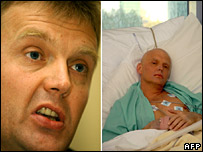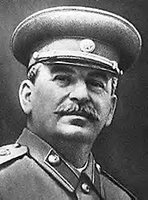The bastards got me.
 Those are the dying words Russian spy Alexander Litvinenko allegedly uttered from his death bed in London last week, which led his loved ones, political pundits and conspiracy buffs to accuse Russian President Vladimir Putin of ordering his assassination. And they felt vindicated when doctors reported over the weekend that Litvinenko was poisoned by a fatal dose of a radioactive substance called Polonium 210, which Putin’s accusers claim “could only be found in government-controlled institutions” in Russia.
Those are the dying words Russian spy Alexander Litvinenko allegedly uttered from his death bed in London last week, which led his loved ones, political pundits and conspiracy buffs to accuse Russian President Vladimir Putin of ordering his assassination. And they felt vindicated when doctors reported over the weekend that Litvinenko was poisoned by a fatal dose of a radioactive substance called Polonium 210, which Putin’s accusers claim “could only be found in government-controlled institutions” in Russia.
Now British authorities have launched a sensational and politically-provocative investigation ostensibly to find out who murdered Litvinenko. This, despite the fact that everyone – from government ministers to Litvinenko’s fellow defectors from Russia’s Federal Security Service (FSB, the successor agency to its infamous KGB) – has already fingered Putin, himself a former KGB spy, for this crime.
The prevailing suspicion is that Putin targeted Litvinenko because he was becoming too credible in his criticisms of the Kremlin. Litvinenko fled for his life in 2000 – after accusing the FSB of killing over 300 Russians in 1999 in a Machiavellian scheme to frame and discredit Chechen rebels.
Then he began publishing the findings of his high-profile investigation into what many suspect was a Putin-ordered hit on journalist Anna Politkovskaya last month. She herself was publishing too many inconvenient truths about that ‘Chechen conspiracy.’
Putin had had enough of them both.
Nonetheless, with all due respect to Scotland Yard and Interpol, no matter how probative the circumstantial evidence of Putin’s guilt, neither he nor his putative hitmen will ever be held to account for this murder. And everyone knows it.
I coined the term “Putinization” to describe the way Putin has been ruling Russia for years more like a criminal enterprise than a democratic country. Among other alleged state-sanctioned crimes, he has confiscated private companies without compensation and thrown the owners in the gulag; curtailed or squashed the freedom of the press; ordered hits on doggedly outspoken critics like Politkovskaya; and extended his totalitarian reach into neighboring countries in a vain attempt to reclaim Soviet-era control over them.
Therefore, it comes as no surprise that Putin would order the assassination of a spy who he considered not just an insufferable critic but a traitor. Nor should it surprise anyone if/when this case results in terminal frustration for Litvinenko’s loved ones (namely his avenging wife and son) and patented futility for British authorities.
 However, if one appreciates that Putin seems determined to emulate former Russian strongman Joseph Stalin, his ordering the assassination of these two journalists would seem relatively benign.
However, if one appreciates that Putin seems determined to emulate former Russian strongman Joseph Stalin, his ordering the assassination of these two journalists would seem relatively benign.
After all, Stalin ordered the assassination of at least one million Russians (at home and abroad) and threw another 18 million in the Gulag for political offenses.
 Of course, it’s in the nature of totalitarian leaders like Stalin and Putin to manage their public image the way they manage sycophantic bureaucrats. Therefore, it should also come as no surprise that Putin would do all he could to intimidate critics he cannot kill. In this regard, here’s how he warned the British and others against drawing reasonable conclusions about his involvement in Litvinenko’s murder:
Of course, it’s in the nature of totalitarian leaders like Stalin and Putin to manage their public image the way they manage sycophantic bureaucrats. Therefore, it should also come as no surprise that Putin would do all he could to intimidate critics he cannot kill. In this regard, here’s how he warned the British and others against drawing reasonable conclusions about his involvement in Litvinenko’s murder:
I hope the British authorities won’t fuel groundless political scandals…. It is a great pity that even such tragic things as human death are used for political provocations. As I know, the medical certificate of British doctors does not indicate that he died a violent death. It does not say that. Hence there is no reason for such talk at all.
(New York Times, November 25, 2006)
His perversely proud reference to the insidious rather than violent method his assassins used to kill Litvinenko speaks volumes, even if unwittingly. Alas, I suspect Putin will feel obliged to say no more.
Meanwhile, given the frequent reports about how unguarded WMDs (including nerve agents) are in Russia, Putin’s supporters could argue that a number of Litvinenko’s other enemies (and he reportedly had quite a few) had access to polonium 210 as well as the motive and opportunity to administer it. Moreover, given the number of locations where traces of this deadly poison has been found, one gets the impression that the FSB was targeting every Putin critic in London, not just Litvinenko.
By the way, has anybody seen Putin’s most celebrated critic, former Chess champion Garry Kasparov, lately….
NOTE: When it was clear to Litvinenko that he would not survive this poisoning, he allegedly penned his own eulogy, which reads, in part, as follows:
As I lie here I can distinctly hear the beating of wings of the angel of death…You may succeed in silencing one man but the howl of protest from around the world will reverberate, Mr. Putin, in your ears for the rest of your life.
May God forgive you for what you have done, not only to me but to beloved Russia and its people.
Related Articles:
UPDATE: The Putinization of Russia extends to Georgia…
BBC Obituary of Alexander Litvinenko
Alexander Litvinenko, Russian spy
Anonymous says
I can’t believe that you are reporting on the killing of a Russian spy and not the killing of an innocent civilian by the New York Police Force!!
This guy was involved in the murky dealings of espionage and had previously been contracted to kill people. We are not dealing with an innocent here. You deal with gangsters, you face the consequences. It’s a nasty business but I’m not sure what this guy was up to in the first place and, frankly, I don’t want to know.
The 23 year old gunned down in New York was in another category altogether. And maybe something you could do actually do something about.
ALH ipinions says
paris ib
I am flattered that you think “maybe” I could “actually do something about” the use of excessive force by NYC police officers. In fact, I probably have as much power to affect their behavior (and reaction to it) as I do to affect Putin’s machinations, which seem designed to turn Russia into a neo-Stalinist state.
Nonetheless, even though I find the victim in the former case more sympathetic, my grave concern for the geopolitical (Cold War) implications (and ramifications) of the latter compelled me to address it first.
However, now that you’ve stolen my thunder (tisk, tisk), I hope I can rely on you to not regard my forthcoming commentary on that trigger-happy episode as having been provoked by your antic and preemptive reprimand…..
Anonymous says
Every smooth talking, self serving, ego driven politician in office occupies his position thanks to the voters (of which in the USA sadly there are few who bother to vote at all). If enough people were outraged and angry by what happens there would certainly be more action by these low life politicians who the people of America choose to provide with a salary, an office and countless perks. More grass roots action can get these people to move, and fast, but first you have to care.
You have no say-so at all about what goes on in Russia. You have a duty to say something about what goes on in the USA.
Have they fixed New Orleans yet?
Why not?
Because the average American doesn’t really give a damn.
ALH ipinions says
Whereas, the average Parisian actually gives a damn about ensuring that the principles of liberté, égalité, fraternité are enjoyed by all Frenchmen. Indeed, so much so that your national outrage over the systematic discrimination against poor African and Muslim citizens, which incited them to set Paris ablaze last year, has forced the elitist politicians who the people of France “chose to provide with a salary, an office and countless perks” to fix this national problem…?
Incidentally, I’m not sure what authority you assume gives you the right to define and proscribe what I “have a duty to say something about”; although I suspect it derives from the same Francophone authority President Jacques Chirac assumed gave him (alone) the right to define and proscribe the terms by which East European countries would be allowed to join the EU….
Anonymous says
Load of rot as usual. You don’t know what you are talking about. And it shows.
The protests last year forced the Government to back down. French citizens know that if they take to the streets they will be taken seriously. “Heads will roll” is more than a metaphor in France. One day perhaps the same will be said in the U.S.A., till then keep paying your taxes and do as your told.
Anyway if you don’t think you have a duty, then that really speaks for it self. And just so you know where you stand: I’m not French. Though I do appreciate your attempt to change the subject by introducing France to a subject in which France isn’t relevant.
When are they going to rebuild New Orleans? You don’t know and you don’t care. Keep blattering on about subjects which don’t concern you. You never know if might get you somewhere. But I don’t think so.
ALH ipinions says
Heads will roll? Sarkozy, the Interior Minister who refers to France’s poor and dispossessed as “voyous” and “racaille” (dregs or riff-raffs) and who many blame for inciting those riots, not only remained in office but is now poised to be elected president of France. Pray tell, Paris IB, whose head was guillotined?
By contrast, Brown, the FEMA director many blame for exacerbating the mess in New Orleans has been exiled to the dust bin of history.
This might be too fine a point for you to appreciate, but I never accused you of being French, Paris IB. I merely ascribed to you the care you claim the average Frenchman has for the poor and dispossessed in her midst that compels her to take to the streets on their behalf.
Apropos this point, what makes you think I’m an American?
Anonymous says
New Orleans has not been rebuilt.
I’m not going to be drawn into a discussion on France with you. First, because you know nothing about the subject and second, because it’s not relevant here, it’s merely your pathetic attempt to change the subject.
You brought up France here, I know not why. I don’t think you are American but I do think you live there and pay taxes there and should be more involved in the problems in the country of your residence.
So when are you going to discuss what happened in New York.